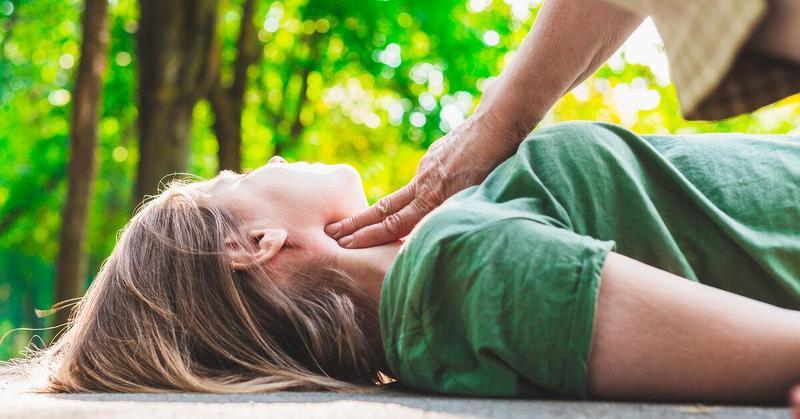Taking care of an unconscious person
Taking care of an unconscious person
Unconsciousness is a state opposite to a conscious state, in which a person is not aware of the surrounding reality and / or does not respond to external stimulation. When a person falls unconscious, other people should know the ways to provide first aid. Evaluate the severity of the injury waiting for the arrival of emergency services. If the person is not breathing they may need CPR.
What you need to do
Identify whether someone is breathing before starting first aid procedures.
Breathing person
Ask them some basic questions and if a person in a state of mental confusion, it is possible that they won't be able to answer correctly. Provide this information to the representative of emergency services.Leave the individual their current state if they have a spinal injury. If not, turn them on their side to stabilize them. Tilt their head back a little so they can breathe without hindrance.
If the person is not breathing, put them on their back.
If you notice heavy bleeding, find the source and apply a tourniquet above the affected area.
Call 911 before performing CPR
Cardiopulmonary resuscitation
Start putting pressure on the sternum of the victim with your hands. The person should be located lying on their back on a firm, flat surface. In this case, the base of the palm of one hand of the first aid participant is placed in the middle of the victim's chest, the second hand is placed on top of the first one, the hands are taken into the lock, the arms are straightened at the elbow joints, the shoulders of the first aid participant are positioned over the victim so that pressure is applied perpendicular to the plane sternum.
Hand pressure on the victim's sternum is performed with the weight of the body of the first aid participant to a depth of 5-6 cm at a frequency of 100-120 per minute.
After 30 hand pressure on the victim's sternum, it is necessary to perform artificial respiration using the "Mouth-to-mouth" method. To do this, open the victim's airways (tilt back their head, raise their chin), pinch their nose with two fingers, take two breaths of artificial respiration.
Don't do these things
As a first aid provider, you should avoid the following things:
! It is recommended to avoid supporting their heads with cushions, as it may prevent them from breathing.
! Don't let them sit up.
! A person who is unconscious should not be splashed with water.
! Avoid slapping them.
! Make sure they do not drink any liquids.
! Avoid grabbing or sweeping something lodged in the throat that you cannot observe. Consequently, it may become lodged deeper.
! You should never leave an unconscious person alone.
Unconsciousness: its causes and effects
Traumas and injuries are not the only things that can lead to unconsciousness. There are a number of other situations as well.
Among the causes are:
- Falling
- Accidents involving serious injuries, such as car accidents
- The skull or chest is hit very hard
- Internal bleeding or severe blood loss
- Choking
- Dehydration
- Hypoglycemia
- Toxic effects of alcohol or carbon monoxide
- Overdosing on drugs
- Hypertension
- Arrhythmias or syncopes of the heart
- Breathing very quickly is hyperventilating
Preventive measures
Having too much time spent in hot places and fainting can lead to unconsciousness. The solution to lightheadedness, nausea, and excessive sweating is lying down with your legs elevated. Consuming more salt and staying hydrated can also help.
A pacemaker or medication may be necessary for those at risk of losing consciousness. Consult your doctor if this concerns you. Additionally, receiving a diagnosis and treatment can help to prevent a loss of consciousness.
Exercise, healthy eating, and regular screenings can prevent causes of unconsciousness, as can seeking medical attention if problems arise.
Be the first to post a message!
